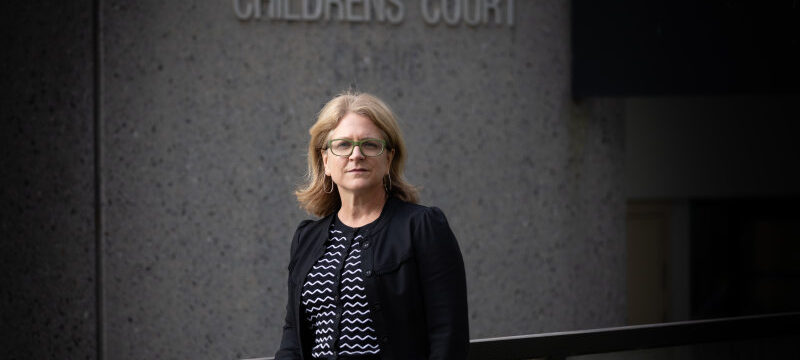Save articles for later
Add articles to your saved list and come back to them any time.
Children in residential care have been charged with offences including breaking a plate and throwing a sponge, as new data shows one in two children who go into residential care in Victoria are charged with a criminal offence within two years.
An analysis of Victoria Legal Aid clients between August 1, 2019 and August 1, 2022, found that after two years in residential care, every second child was charged with an offence. The service has seen charges brought for property damage during a self-harm attempt.
Joanna Fletcher, Victoria Legal Aid’s executive director of family, youth and children’s law.Credit: Jason South
There are about 500 children in residential care in Victoria. Almost all of those charged with an offence would use the legal aid services, said Joanna Fletcher, Victoria Legal Aid’s executive director of family, youth and children’s law.
Two-thirds of children aged 10 to 14 in the setting will have subsequent contact with the justice system, according to Victorian government data cited by the truth-telling Yoorrook Justice Commission in its landmark report released this week.
Fletcher said charges were often brought for incidents that would not result in a police callout to a home.
“These are young people in the care of the state because of past trauma and neglect,” she told The Age during National Child Protection Week.
Children in residential care have been charged with breaking plates and throwing a sponge.Credit: John Donegan
“We should be part of their healing journey and helping them move forward with their lives. Whereas instead, what’s happening in residential care is we’re basically putting them on a path to criminalisation.”
The Yoorrook inquiry heard children were charged for throwing a sponge at a staff member, breaking a plate or stealing food from communal kitchens.
One Legal Aid client, aged 14, was last year charged for threatening a residential care staff member with a ruler.
Fletcher said there were examples of charges brought for property damage during a self-harm attempt.
Property damage, the most common charge, accounted for 25.2 per cent of alleged offences.
Residential care is a group setting overseen by paid staff, unlike home-based settings such as foster care or kinship care within an Aboriginal child’s extended family or network.
State departments and Victoria Police more than three years ago signed an agreement to combat over-policing of children in state care. These children often enter the system with significant trauma and are at risk of being exposed to further trauma or abuse while they are in residential care.
The agreement dictated that police should not be called unless necessary, and if their intervention is required, charges should not be pursued if there is an alternative. The action plan was only signed in March, after COVID-19 delays.
Liana Buchanan, Victoria’s Commissioner for Children and Young People.Credit: Justin McManus
The criminalisation of children was particularly pronounced in residential care, the data shows – with 42 per cent charged in their first year of placement, and 51.3 per cent after two years – compared with other out-of-home settings.
Of the children charged with an offence within the first year of placement in residential care, Victoria Legal Aid found 23.6 per cent identified as First Nations and 27.5 per cent were under 14.
The legal service and the Commission for Children and Young People argued this was further evidence that Victoria should immediately raise the age of criminal responsibility from 10 to 14, rather than taking a staged approach.
“These are children whose histories of trauma and neglect have brought them into the out-of-home care system; for that system to cause police and criminal justice contact is unfair and unacceptable,” Commissioner for Children and Young People Liana Buchanan said.
Meena Singh, the Commissioner for Aboriginal Children and Young People, said the residential care system severed “connection from family and country, which in turn compounds intergenerational trauma and creates ever greater risks of mental health and socioeconomic disadvantage”.
The May state budget included $548 million over four years to improve outcomes for children in residential care.
“This includes ensuring young people in residential care have access to therapeutic supports, that help them to heal and recover from trauma, and continued funding for 25 new two- and three-bed therapeutic residential care homes,” a government spokesman said.
Yoorrook recommended a mechanism be established under the Commission for Children and Young People to oversee breaches of the agreement signed by state departments and police.
A Victoria Police spokesman said the agreement had been promoted within its workforce. He said the force was supportive of reducing reliance on police to respond to concerning behaviour within residential care, and was committed to using cautions and diversions where possible.
“As part of this commitment, Victoria Police has made significant changes to our cautioning policies to remove barriers to cautioning identified through consultation with youth and legal service providers,” the spokesman said.
“Local police continue to work with their Department of Families, Fairness and Housing counterparts and residential care providers to develop proactive approaches to reducing the need for police involvement in low-level matters occurring in residential care.”
Opposition Leader John Pesutto, who has temporarily taken over as the opposition’s child protection spokesman, said the Andrews government was failing Victoria’s most vulnerable children, who deserved a supportive home to reach their potential.
The Morning Edition newsletter is our guide to the day’s most important and interesting stories, analysis and insights. Sign up here.
Most Viewed in Politics
From our partners
Source: Read Full Article



